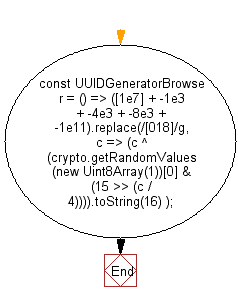
Caching random data is not always desirable, so as an additional option, the Node.js implementation of crypto. In contrast, crypto.randomUUID() has a mean execution time of only 350 nanoseconds per UUID, with a minimum of 220 and a maximum of 663551. Running on my benchmark server locally, the uuid module has a mean execution time of about 1030 nanoseconds per UUID, with a minimum of 640 and a maximum of 870399. The h1 histogram shows the results for the uuid module. These are the only fixed values in a random UUID - all other bits in the sequence are randomly generated.Ĭopy to Clipboard import )

The reserved field identifies the variant which is encoded into the clock-seq-and-reserved field in the eighth byte in the UUID. As described in RFC 4122, the version is “in the most significant 4 bits of the timestamp (bits 4 through 7 of the time_high_and_version field)”, which - if it’s not clear - are the four most significant bits of the sixth byte in the UUID. The version and reserved fields in the UUID identify the layout and type. Of particular note in this structure are the “version” and “reserved” bits (the time-high-and-version and clock-seq-and-reserved fields in the structure definition above). They actually have a structure as defined by RFC 4122:Ĭopy to Clipboard UUID = time-low "-" time-mid "-" UUIDs aren’t simply a sequence of hex-encoded digits. It’s also worth knowing that uuid module maintainers helped us to review the new API that landed in Node.js core). (It’s important to note that the uuid module is not going anywhere.
UUID GENERATOR JS CODE
Historically in Node.js, if you’ve wanted to generate UUIDs, the go-to module on npm has always been the appropriately named uuid module, a small and useful piece of code that is downloaded over 50 million times per week.

The irony is that, with the complex definitions and variations that do exist, the random UUID (so-called “version 4 UUIDs”) is by far the most popular and widely used. They don’t realise there’s actually an IETF RFC detailing the construction and format of multiple variations of UUID - all of which share a common serialisation and structure with significant variations on exactly how the bytes are derived. Most developers look at them and assume they’re nothing more than a random sequence of hex-encoded bytes. Universally Unique Identifiers (UUIDs) are surprisingly complex little structures. We introduced you to Node.js’s new Web Cryptography API implementation and the new support for the HKDF key derivation scheme previously, and in this post, we discuss two powerful new capabilities for generating random UUIDs and random prime numbers: Generating random UUIDs Much has been happening in the Node.js crypto subsystem lately.
UUID GENERATOR JS HOW TO
You can also check for the ID collision probability offers powerful new capabilities for generating random UUIDs and random prime numbers. unique string id js create unique id in node js js uuid library uuid generieren js how to use uuid in nodejs generate a unique id for each element javascript generate unique id for elements in javascript how to give a unique id to the object created javascript uuid example javascript uuid nodejs tutorial uuid node js tutorial why uuid is use in. Importing const = require( "nanoid/non-secure") Will write the code in a Node.js environment using CommonJS import. Let’s take a look at 4 different ways to generate UUIDs in JavaScript. NanoID is available in almost all the most used programming languages.ĭisclaimer: All the above claims are picked from the package's docs itself. We can control the behaviour of alphabets to be used.


It is an npm package to generate a unique string ID. If you are a JavaScript developer, I am pretty much sure that you have used the npm package UUID at least once in your development journey.įor those who don't know what is UUID.


 0 kommentar(er)
0 kommentar(er)
